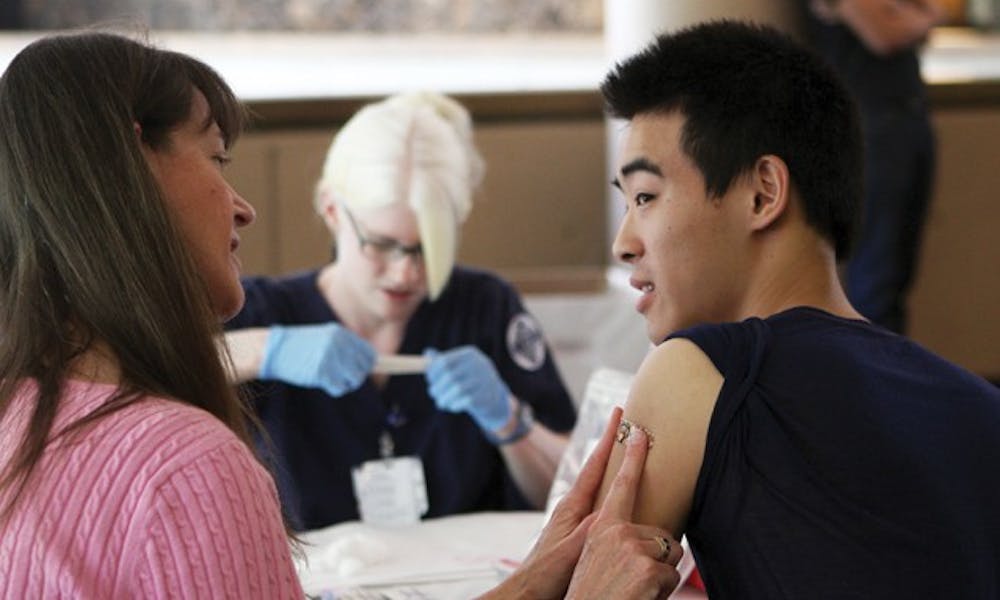Flu Crew fever has swept through East Campus.
For three years, Duke undergraduates have participated in a scientific study that tests a genomic early-detection technology for viral illnesses, such as the flu. The Flu Crew team, led by Dr. Geoffrey Ginsburg, director of Genomic Medicine in the Duke Institute for Genome Sciences and Policy, has sought volunteers for the project, which has since expanded to study bacterial infections and other types of pathogens. More than 400 freshmen are currently participating in the flu study this year by answering a daily questionnaire posted on Blackboard. Ultimately, researchers would like to be able to identify sick individuals before symptoms occur.
“If we are successful, this will be something that will have a major impact on public health because early detection on a number of diseases and illnesses can lead to much more effective therapeutic treatment,” Ginsburg said.
Duke freshmen participate in the experiment to provide real world application of data that researchers initially discovered in a laboratory. The participants answer eight questions about how they are feeling each day, and researchers score their responses to determine whether they are developing an illness. If a participant scores above a certain threshold, Flu Crew members seek out the individual to evaluate his health, take blood samples and find out who else may have come in contact with him. Flu Crew leaders Brad Nicholson, head of the molecular epidemiological research lab at the Durham Veterans Administration Hospital, and Christopher Woods, associate professor of medicine in the infectious diseases division of the Duke School of Medicine, help Ginsburg analyze the samples.
Because diseases spread quickly in residence halls, the flu study helps recognize infected individuals and isolate the illness before it spreads, Ginsburg said. Participating in the flu study also makes students more attentive to their health, so they can recognize when they are beginning to develop symptoms.
“I was sick a few months ago, and the flu study helped me recognize it and schedule a doctor’s appointment,” freshman participant Paige Morschauser said. “I was so swamped with schoolwork that, if not for those questionnaires, I probably would not have bothered to take the time to make an appointment.”
This study is part of a larger project led by the Duke Institute for Genome Sciences and Policy with funding from the Defense Advanced Research Projects Agency of the U.S. Department of Defense. The U.S. military is particularly interested in the research because early detection of diseases would help the military continuously evaluate its soldiers and make sure that they have “warfighter readiness,” Ginsburg said.
“I was interested in this study because it affects troops overseas,” freshman participant Emily Holway said. “By participating in the study, we have the chance to help them learn how to prevent sickness in the military.”
If successful, the team’s research will be a new, powerful way of evaluating patients in any medical situation—emergency rooms, battle fields, primary care doctors’ offices, nursing homes and even on Duke’s campus, Ginsburg said. Early detection can ultimately lead to better outcomes and increased effectiveness of therapeutics, he added.
The project draws researchers from Duke’s different disciplines, including the Institute for Genome Sciences and Policy, Duke University Medical Center, the Durham Veterans Affairs Medical Center and the Pratt School of Engineering.
“This is an example of the kind of research programs that Duke is uniquely positioned to do because of our commitment to do interdisciplinary research,” Ginsburg said. “It’s a testament to [that] commitment.”
Get The Chronicle straight to your inbox
Signup for our weekly newsletter. Cancel at any time.

